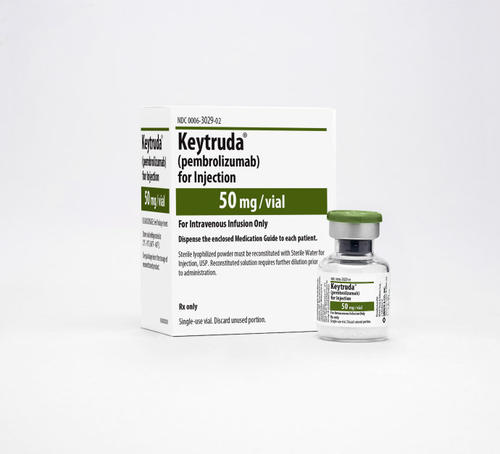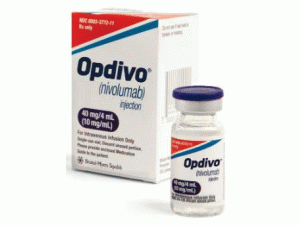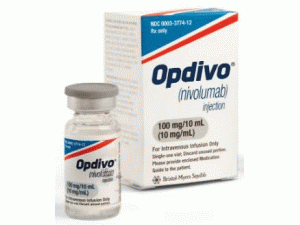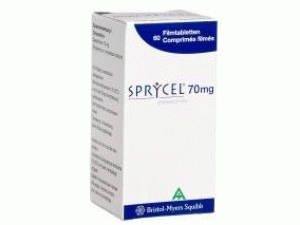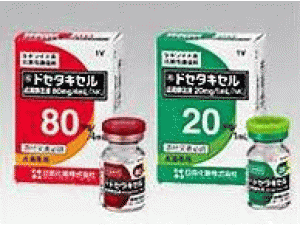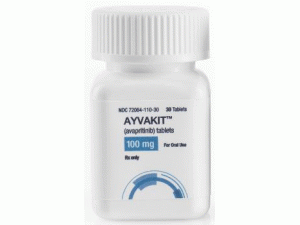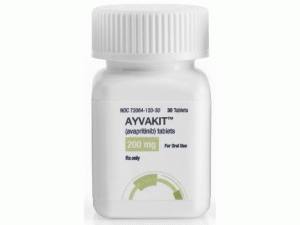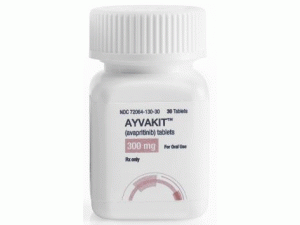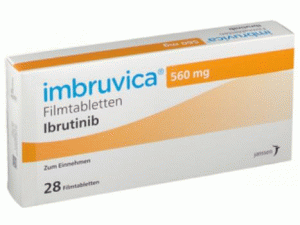托西莫单抗Tositumomab(BEXXAR)
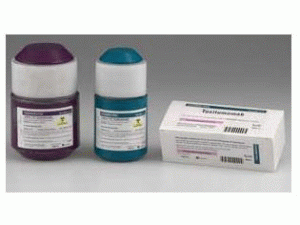 产地国家:美国
处方药:是
所属类别: 14毫克/毫升 34.7毫升/瓶
包装规格: 14毫克/毫升 34.7毫升/瓶
计价单位:套件
生产厂家英文名:SMITHKLINE BEECHAM
原产地英文商品名:BEXXAR DOSIMETRIC 14mg/mL 34.7mL/Vial
原产地英文药品名:TOSITUMOMAB
中文参考商品译名:百克沙 DOSIMETRIC 14毫克/毫升 34.7毫升/瓶
中文参考药品译名:托西莫单抗
产地国家:美国
处方药:是
所属类别: 14毫克/毫升 34.7毫升/瓶
包装规格: 14毫克/毫升 34.7毫升/瓶
计价单位:套件
生产厂家英文名:SMITHKLINE BEECHAM
原产地英文商品名:BEXXAR DOSIMETRIC 14mg/mL 34.7mL/Vial
原产地英文药品名:TOSITUMOMAB
中文参考商品译名:百克沙 DOSIMETRIC 14毫克/毫升 34.7毫升/瓶
中文参考药品译名:托西莫单抗
简介
药理作用:托西莫单抗是一种在正常及恶性B淋巴细胞表面发现的鼠抗CD20抗原IgG2aλ单克隆抗体,能与CD20抗原特异结合(人B淋巴细胞耐受分化抗原,Bp35或B1)。该抗原前B淋巴细胞表达的跨膜磷蛋白,在发育成熟的B淋巴细胞中浓度高,该抗原也在90%以上的非霍奇金淋巴瘤(NHL)上表达。抗原决定簇的识别在CD20抗原细胞外,CD20不随抗体结合而从细胞表面脱落,也不嵌入细胞。 作用机制:诱导细胞凋亡,补体依赖细胞毒性(CDC),抗体依赖性细胞介导的细胞毒作用(ADCC)。另外,细胞凋亡也与同位素的放射有关。本品能够促进机体免疫系统攻击癌细胞并将一定剂量的放射引向肿瘤部位。 药动学:NHL患者静注485mg托西莫单抗后平均血浆清除率为68.2mg/h,本品在肿瘤负荷高、脾脏大或骨转移的患者中具有清除率加快、消除半衰期短、表观分布容积大的特点。131I的消除经衰变,由肾脏排出。5天后67%注射剂量被清除,其中78%从尿中回收。 适应症:用于治疗表达CD20抗原的复发性或难治性低分度滤泡状或已变形的NHL患者,包括那些对利妥昔单抗无应答的难治性NHL患者。 禁忌症:本品禁用于孕妇或对该疗法中任一成分过敏的患者。 注意事项:1.本品对生存率的作用尚未可知。2.本品不能用作CD20抗原阳性NHL患者的初始疗法。3.本品只能使用一个疗程。多个疗程或者与其他放疗或化疗联用的安全性还未评估。4.托西莫单抗注射剂2~8℃保存。溶解后2~8℃可保存24h,室温可保存8h。131I-托西莫单抗注射剂2~8℃保存。溶解后2~8℃或室温可保存8h。 不良反应:本品可致大多数患者血细胞(血小板、白细胞以及红细胞)计数严重下降。约一半的患者发生感染,1/8的患者出血,近1/4的患者需要支持性医护。其他与输液有关的较轻的不良反应包括发热、寒战、出汗、恶心、低血压、呼吸短促和呼吸困难。在给予本品后,可能会增加患甲状腺功能低下的风险。 用法用量:本品治疗分两个独立阶段:剂量测定阶段为7~14天,随后为治疗阶段。 1.剂量测定阶段:(1)托西莫单抗450mg溶于0.9%氯化钠注射液50ml中静滴60min以上。若出现轻、中度毒性,滴速降低50%,若出现严重毒性应停药。(2)131I-托西莫单抗(含蛋白35mg,131I 5.0mCi)溶于0.9%氯化钠注射液30ml中静滴20min以上。若出现轻、中度毒性,滴速降低50%,若出现严重毒性应停药。 2.治疗阶段:(1)托西莫单抗450mg溶于0.9%氯化钠注射液50ml中静滴60min以上。若出现轻、中度毒性,滴速降低50%,若出现严重毒性应停药。(2)131I-托西莫单抗:根据说明书所标活性浓度计算治疗所需131I-托西莫单抗剂量。若出现轻、中度毒性,滴速降低50%,若出现严重毒性应停药。(3)血小板≥150000/mm3者剂量:131I 75cGy全身照射,托西莫单抗35mg静滴20min。(4)血小板100000~150000/mm3者剂量:131I 65cGy全身照射,托西莫单抗35mg静滴20min。 3.联合治疗:患者给予以下辅助治疗后方可用托西莫单抗治疗。饱和碘化钾溶液,口服,每次4滴,每日3次;卢戈碘溶液:口服,每次20滴,每日3次,或碘化钾片每日130mg。甲状腺保护剂应在131I-托西莫单抗治疗前24h开始使用,持续到131I-托西莫单抗治疗后2周。托西莫单抗治疗前30min给予对乙酰氨基酚650mg口服,苯海拉明50mg口服。 存储:将托西莫单抗(35mg和225mg)的小瓶(包括稀释的小瓶)储存在36oF至46oF(2oC至8oC)。避免强光。不要动摇;不要冻结。当冷藏并且在室温下长达8小时时,稀释的毒素瘤溶液可稳定长达24小时。丢弃未使用的部分。I-131 tositumomab:将I-131 tositumomab小瓶储存在原始铅罐中,温度为-4°F(-20°C)或更低,直至给药前解冻。解冻的剂量和治疗剂量的I-131托西莫单抗(包括稀释的小瓶)在36°F至46°F(2°C至8°C)或室温下可稳定长达8小时。I-131 tositumomab不含防腐剂。不要动摇;不要冻结。英文版说明书
Radioimmunotherapy for lymphomas.Zeva lin and Bexxar are now approved for treatment of Rituximab-refractory follicular non-Hodgkin's lymphomaIn February 2002, Zeva lin was the first radioimmunotherapy to receive FDA approval. Zeva lin is indicated for the treatment of relapsed or refractory low grade, follicular, or transformed B-cell non-Hodgkin's lymphoma (NHL). This indication includes patients with Rituxan (rituximab)-refractory follicular NHL. Zeva lin has been approved as part of a therapeutic regimen involving Rituxan.On June 30, 2003 Corixa and GlaxoSmithKline announced FDA approval of BEXXAR (Tositumomab and Iodine I 131 Tositumomab) for the treatment of patients with CD20 positive, follicular NHL, with and without transformation, whose disease is refractory to Rituximab and has relapsed following chemotherapy.(see site for Zeva lin) for Bexxar Corixa site and comparisons.)Zeva lin consists of a monoclonal antibody linked to the radioactive isotope yttrium-90. After infusion into a patient, the monoclonal antibody targets the CD20 antigen, which is found on the surface of mature B cells and B-cell tumors. In this manner, cytotoxic radiation is delivered directly to malignant cells.xZeva lin received both a full approval and an accelerated approval based on results from two major US efficacy studies.The study that supported the full approval of Zeva lin included 54 subjects. The subjects were diagnosed with relapsed follicular lymphoma, and they no longer adequately responded to Rituxan treatment. An overall response rate of 74% was achieved with Zeva lin treatment, with 15% of subjects experiencing a complete response.Accelerated approval of Zeva lin was supported by a randomized, controlled phase III trial. The trial included 143 subjects with relapsed or refractory, low grade or follicular NHL or transformed B-cell NHL. An overall response rate of 80% was obtained in subjects receiving the Zeva lin therapeutic regimen (73 subjects), compared to 56% for the subjects receiving Rituxan alone (70 subjects). Thirty percent of Zeva lin-treated subjects experienced a complete response, compared to a 16% complete response rate for Rituxan-treated subjects. Some studies are noted below131I-Tositumomab Therapy as Initial Treatment for Follicular LymphomaMark S. Kaminski, M.D., NEJM 2005;352_441Background Advanced-stage follicular B-cell lymphoma is considered incurable. Anti-CD20 radioimmunotherapy is effective in patients who have had a relapse after chemotherapy or who have refractory follicular lymphoma, but it has not been tested in previously untreated patients.Methods Seventy-six patients with stage III or IV follicular lymphoma received as initial therapy a single course of treatment with 131I-tositumomab therapy (registered as Tositumomab and Iodine I 131 Tositumomab [the Bexxar therapeutic regimen]). This consisted of a dosimetric dose of tositumomab and 131I-labeled tositumomab followed one week later by a therapeutic dose, delivering 75 cGy of radiation to the total body.Results Ninety-five percent of the patients had any response, and 75 percent had a complete response. The use of polymerase chain reaction (PCR) to detect rearrangement of the BCL2 gene showed molecular responses in 80 percent of assessable patients who had a clinical complete response. After a median follow-up of 5.1 years, the actuarial 5-year progression-free survival for all patients was 59 percent, with a median progression-free survival of 6.1 years. The annualized rate of relapse progressively decreased over time: 25 percent, 13 percent, and 12 percent during the first, second, and third years, respectively, and 4.4 percent per year after three years. Of 57 patients who had a complete response, 40 remained in remission for 4.3 to 7.7 years. Hematologic toxicity was moderate, with no patient requiring transfusions or hematopoietic growth factors. No cases of myelodysplastic syndrome have been observed.Conclusions A single one-week course of 131I-tositumomab therapy as initial treatment can induce prolonged clinical and molecular remissions in patients with advanced follicular lymphoma.Monoclonal antibody therapy for lymphoma.Dillman RO. Cancer Pract 2001 Mar-Apr;9(2):71-80Robert O. Dillman, MD, FACP, Medical Director, Hoag Cancer Center, Director, Laboratory and Clinical Research, Hoag Cancer Center, Newport Beach, California.The history of clinical applications of monoclonal antibodies has been intertwined with that of lymphomas. The first report of a complete remission in 1981 described a patient with follicular lymphoma who was treated with a murine anti-idiotype antibody. Later that decade there appeared additional encouraging reports of radiolabeled monoclonal antibodies, immunotoxins, and other antibodies with antitumor effects against lymphoma and chronic lymphocytic leukemia. Monoclonal antibodies as a treatment of malignancy became reality in late 1997 when the US Food and Drug Administration approved the anti-CD20 chimeric monoclonal antibody rituximab for the treatment of B-cell lymphoma. Since that time an anti-CD25 monoclonal antibody (dacliximab) and an anti-CD25 immunotoxin fusion product (denileukin diftitox) have become clinically available. Several radio- labeled antibodies, including the murine anti-CD20 products 131I-tositumomab and 90Y-ibritumomab tiuxetan, are in advanced stages of clinical testing as are other unlabeled monoclonal antibodies with antilymphoma activity. Other antilymphoma immunotoxins that react with CD25, CD19, and CD22 also have shown promise.Antibody therapy of lymphoma.用药温馨提示:当您服用此药物时,需定期接受医疗专业人士的检查,以便随时针对其药效、副作用等情况进行监测。本网站所包含的信息旨在为患者提供帮助,不能代替医学建议和治疗。
药品价格查询,专业药品查询网站,药品说明书查询,药品比价 » 托西莫单抗Tositumomab(BEXXAR)
药品价格查询,专业药品查询网站,药品说明书查询,药品比价 » 托西莫单抗Tositumomab(BEXXAR)

